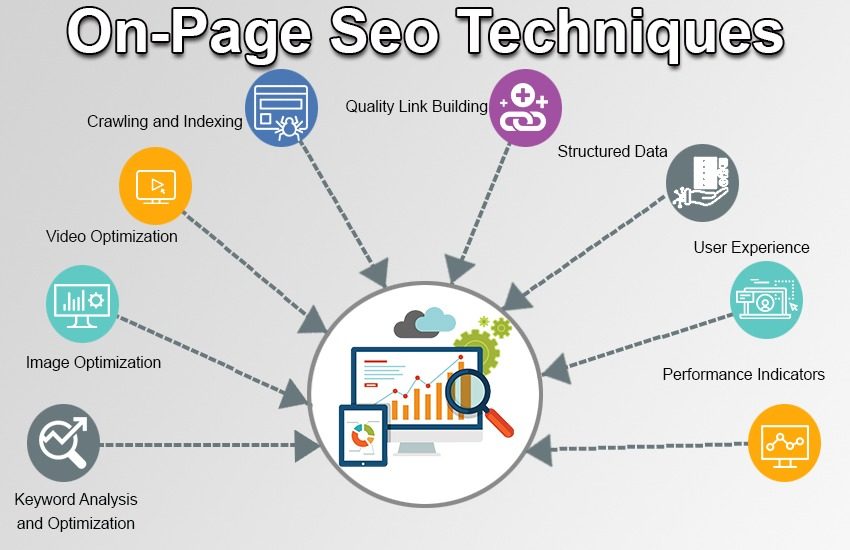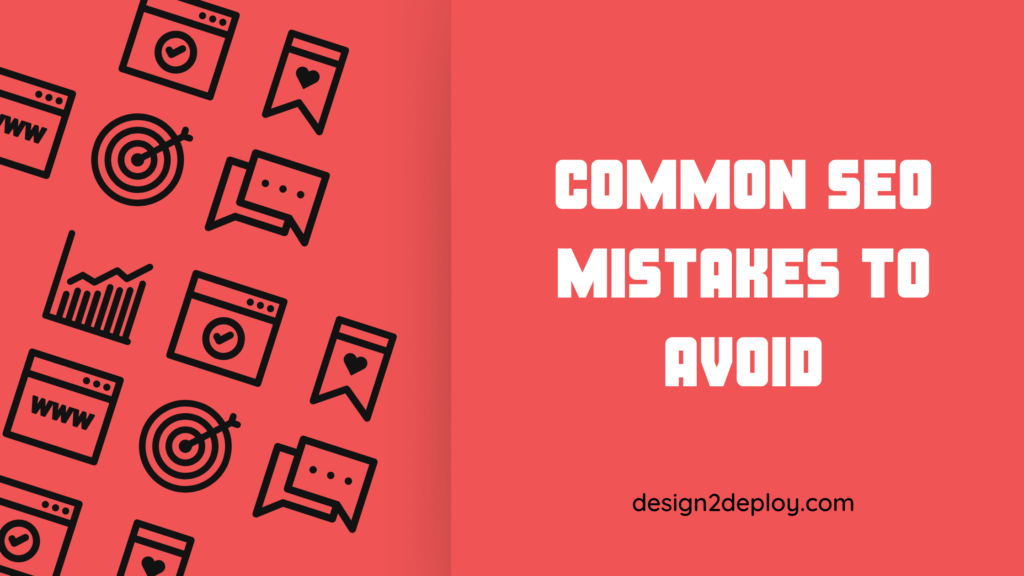This blog post aims to highlight some of the common SEO mistakes that beginners often make and provide you with insights and tips to help you avoid them. We will cover everything from keyword research and optimization techniques to on-page and off-page strategies.
Understanding the Importance of SEO for Your Website
Having a website alone is not enough, you need to ensure that your website is easily discoverable by search engines and potential visitors to get more leads and clients for your business.
This is where SEO (Search Engine Optimization) comes in. SEO refers to various techniques and strategies aimed at improving your website’s visibility in search engine results pages (SERPs). By optimizing your site, you can attract more organic traffic and increase the chances of converting visitors into customers.

One of the primary reasons why SEO is crucial for your website is that it helps you rank higher on search engine result pages. When people search for relevant keywords related to your business or industry, appearing on the first page of results significantly increases the likelihood that they will click through to your site.
Another reason why SEO matters is that it enhances user experience. Search engines prioritize websites that offer valuable content, fast loading times, mobile responsiveness, and easy navigation. By implementing proper optimization techniques, you can create a user-friendly experience that keeps visitors engaged and encourages them to explore your website further.
Moreover, SEO helps build credibility and trust with both users and search engines alike. When your website ranks well in SERPs consistently over time, it signals authority in your niche or industry. This perception of expertise makes users more likely to trust your brand and choose you over competitors.
Lastly, investing in effective SEO strategies provides long-term benefits for your website’s success. Unlike paid advertising methods where visibility stops once you stop paying for ads, optimizing your site ensures ongoing organic traffic even when marketing budgets may fluctuate.
Understanding the importance of SEO practices can help take your online presence to a significantly higher level.
Common SEO Mistakes Made by Beginners
Optimizing your website for search engines can be challenging, especially for beginners. However, avoiding common mistakes can help you reach your target audience more effectively. Here are some of the biggest SEO mistakes made by beginners:
- Ignoring Keyword Research: Conducting proper keyword research is crucial for optimizing your website effectively. Not understanding what keywords people use to search for your products or services can hurt your website’s visibility.
- Keyword Stuffing: Overusing keywords can lead to keyword stuffing, which search engines penalize. Use keywords naturally and strategically within your content.
- Neglecting On-Page Optimization: Optimize on-page elements such as meta tags, headings, and alt tags for images to help search engines better understand the context of your web pages.
- Lack of Quality Content: Content is essential for SEO success. Create high-quality and relevant content to attract visitors and keep them engaged on your site longer.
- Not Building Backlinks: Building high-quality backlinks from reputable websites within your industry is crucial for off-page optimization and improving organic rankings.
- Not Monitoring Analytics Data: It’s important to monitor and measure your website’s performance regularly to identify areas that need improvement.
By avoiding these common SEO mistakes, you’ll be setting yourself up for success.
Keyword Research and Optimization
Keyword research and optimization are critical aspects of SEO. It involves identifying relevant keywords that your target audience uses to search for products or services similar to what you offer and optimizing your website content accordingly.
Beginners often make the mistake of choosing highly competitive keywords that are difficult to rank for. Instead, focus on long-tail keywords that have lower competition but higher relevance to your business. This will help you attract more targeted traffic to your website.
Once you have identified the relevant keywords, it’s important to optimize your website content by incorporating them strategically. However, avoid overstuffing your content with keywords, as this can negatively impact user experience and lead to penalties from search engines.
In addition to using keywords in your website content, consider optimizing other elements such as meta tags, headings, URLs, and alt text for images. These optimizations will give search engines a clear understanding of what each page is about and improve its chances of appearing in relevant search results.
Regularly monitoring keyword performance is essential for effective optimization. Analyze which keywords are driving traffic and conversions, while also keeping an eye on any new trends or changes in user behavior.
Remember that SEO is an ongoing process. Continuously refining and updating your keyword strategy based on data analysis will help you stay ahead of the competition in organic search rankings.
On-page SEO Techniques
When optimizing your website for search engines, on-page SEO techniques are essential for determining how well your site ranks in search results.

These techniques involve optimizing various elements on each page of your website to make them more appealing and relevant to both search engines and users.
- Keyword Optimization – It is one of the most important aspects of on-page SEO. Conduct thorough keyword research to identify the terms and phrases that are most relevant to your website’s content. Place these keywords strategically throughout your webpage, including in the title tag, meta description, headings, and within the body text.
- Page Speed – Ensuring that your webpage loads quickly is another key element of on-page optimization. Slow-loading websites not only frustrate visitors but also result in lower rankings by search engines. To improve loading times, optimize image sizes, minimize code bloat, and use caching tools.
- Quality Content – Creating high-quality and engaging content is essential for on-page SEO success. Your content should be informative, well-written, and easy for users to understand. Incorporating relevant keywords naturally into your content will help improve its visibility in search engine rankings.
- Internal Linking – Linking content within your site is also important. Internal links help establish a clear navigation structure for both users and search engine crawlers. By interlinking related pages or articles within your site using descriptive anchor texts, you can enhance user experience while also improving crawlability.
By implementing these on-page SEO techniques effectively across all pages of your website you can increase the chances of ranking higher in search engine results pages (SERPs), attract more organic traffic, and ultimately boost conversions.
Off-page SEO Strategies
Off-page SEO strategies are crucial for improving your website’s visibility and authority. While on-page optimization focuses on optimizing elements within your website, off-page SEO involves actions taken outside of your site to improve its ranking in search engine results.

- Link building – It is one important off-page strategy. Acquiring high-quality backlinks from reputable websites enhances your website’s credibility and demonstrates its relevance to search engines. However, focus on quality rather than quantity when building links.
- Content Marketing – Social media marketing is another effective off-page strategy. Social media platforms provide opportunities for businesses to engage with their audience, share valuable content, and generate traffic back to their website. Creating compelling and shareable posts can increase brand awareness and attract potential customers.
- Online directories – They are worth exploring for off-page optimization. Submitting your business information to relevant directories helps users discover your website and contributes to improved search engine rankings.
- Guest blogging – It allows you to establish yourself as an industry expert while gaining exposure through other websites’ audiences. By contributing informative and valuable content as a guest blogger, you can build relationships with influential bloggers or publications in your niche.
Remember to approach each off-site strategy strategically and ethically, avoiding any black-hat tactics that may harm your website’s reputation and brand identity.
Implementing these off-page techniques alongside solid on-page optimization can greatly contribute to better search engine rankings for your website over time.
Monitoring and Measuring Results
Monitoring and measuring the results of your SEO efforts are crucial for understanding the effectiveness of your optimization strategies. By analyzing data and metrics, you can gain valuable insights into how well your website is performing in search engine rankings.
Google Analytics is one essential tool for monitoring SEO results. This powerful platform allows you to track key metrics such as organic traffic, bounce rate, average time on page, and conversion rates. Regularly reviewing this data can help you identify trends and patterns that can inform future optimization decisions.
In addition to Google Analytics, other SEO tools like ubersuggest, SEMrush, and SEO frog provide more specific insights into keyword rankings and backlink profiles. These tools allow you to see where your website stands in search engine results pages (SERPs) for targeted keywords and measure the impact of your link-building efforts.
It’s important not only to monitor the overall performance of your website but also to measure specific goals or conversions.
Regularly reviewing these metrics will help you identify areas where improvements can be made. Remember that SEO is an ongoing process rather than a one-time fix, so consistently monitoring and measuring results will ensure continuous progress towards optimizing your website for better search engine visibility.
Tips for Avoiding Common SEO Mistakes
Avoiding common SEO mistakes is crucial for improving your website’s visibility and driving more organic traffic. Here are some tips to help you avoid the most common SEO mistakes made by beginners:

- Conduct Proper Keyword Research: Identify relevant keywords that have high search volume and low competition to increase your chances of ranking higher in search engine results.
- Optimize On-Page Elements: Optimize your page titles, meta descriptions, headings, and alt tags with relevant keywords to improve visibility and attract more organic traffic.
- Don’t Overdo Keyword Stuffing: Avoid stuffing your content with excessive keywords as it can negatively impact user experience and cause Google penalties.
- Create Quality Content: Focus on creating original and informative content that provides value to readers. This will improve user engagement and attract more backlinks from other reputable websites.
- Build High-Quality Backlinks: Building a strong backlink profile is essential for improving your website’s authority and rankings in search results. However, be cautious about acquiring backlinks from low-quality or spammy websites.
- Regularly Monitor Your Analytics: Keeping track of your website’s performance through analytics tools like Google Analytics is crucial for identifying areas of improvement and measuring the effectiveness of your SEO efforts.
- Utilize Social Media Platforms: Promoting your content on social media platforms helps drive traffic to your website while increasing its visibility online.
Conclusion
Optimizing your website for search engines is crucial for its success. By avoiding common SEO mistakes and following best practices, you can improve your website’s visibility, attract more organic traffic, and increase your chances of ranking higher in search engine results.
Remember to conduct thorough keyword research and optimize your content accordingly. Utilize on-page SEO techniques such as optimizing meta tags, headings, and images to make it easier for search engines to understand the relevance of your web pages. Additionally, implement off-page SEO strategies like building high-quality backlinks to establish authority and credibility.
Always monitor and measure the results of your SEO efforts using tools like Google Analytics. This will allow you to identify what is working well for your website and make necessary adjustments if needed.



